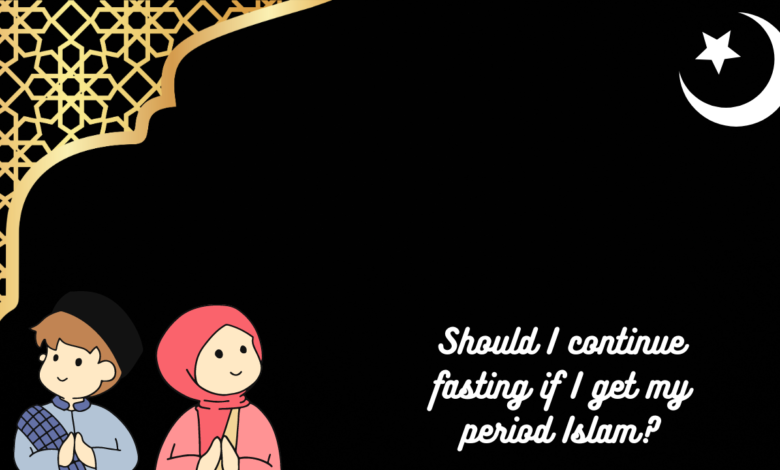Should I continue fasting if I get my period Islam?

Introduction
Fasting holds a significant place in Islam as one of the Five Pillars, observed during the holy month of Ramadan. However, the question of whether to continue fasting while menstruating is a matter that many Muslim women grapple with. The topic is not only about religious devotion but also involves health, spirituality, and personal beliefs. This article aims to provide insights into the considerations surrounding fasting during menstruation in Islam.
Understanding the Islamic Perspective:
Islamic teachings provide guidance on fasting, emphasizing its spiritual significance and the need for personal discipline. However, Islamic jurisprudence takes into account the well-being of individuals, and this is particularly relevant when it comes to women’s health and menstruation.
According to most Islamic scholars, menstruating women are exempt from fasting during Ramadan. This exemption is rooted in the understanding that menstruation is a natural biological process, and fasting during this time might cause undue discomfort or harm. The Quran explicitly states in Surah Al-Baqarah (2:184-185) that those who are ill or on a journey are exempt from fasting and can make up the missed days later. Some scholars include menstruating women under the category of those exempt due to illness.
Spirituality and Connection:
For many women, menstruation is a time of physical and emotional discomfort. Some may feel disconnected from their spirituality during this period. It’s important to note that abstaining from fasting during menstruation does not diminish one’s spirituality. Islam recognizes the diverse ways in which individuals can connect with their faith. Engaging in acts of worship other than fasting, such as increased prayer, supplication, and reading Quranic verses, can maintain a strong spiritual connection.
Personal Choice and Cultural Influences:
The decision of whether to continue fasting during menstruation is ultimately a personal one. While Islamic teachings provide guidance, cultural factors, family beliefs, and personal health considerations may also play a role. Some women may feel comfortable continuing to fast while menstruating, believing that their devotion and commitment transcend physical discomfort. Others may prioritize their health and well-being, choosing to refrain from fasting to avoid potential negative effects on their bodies.
Maintaining the Rituals:
Even if a woman chooses not to fast during her menstruation, she can still participate in the spirit of Ramadan by engaging in other acts of worship and charity. These include offering additional prayers, making supplications, engaging in acts of kindness, and supporting those in need. These actions can help maintain the sense of community and devotion that characterizes the holy month.
Consulting with Scholars:
If unsure about whether to continue fasting during menstruation, seeking guidance from knowledgeable Islamic scholars or local religious leaders can provide clarity. They can offer insights based on Islamic jurisprudence, taking into consideration various schools of thought and individual circumstances.
In Conclusion:
Fasting during menstruation in Islam is a topic that involves a careful balance between religious devotion, personal health, and individual beliefs. While the majority of scholars agree that menstruating women are exempt from fasting, the decision ultimately rests with the individual. It’s important to prioritize both spiritual well-being and physical health, remembering that acts of worship extend beyond fasting alone. Seeking knowledge, engaging in alternative acts of devotion, and maintaining a strong connection to faith can contribute to a meaningful and fulfilling Ramadan experience.
FAQs about Fasting During Menstruation in Islam
Should I continue fasting if I get my period in Islam?
According to Islamic teachings, menstruating women are exempt from fasting during Ramadan or any other obligatory fasts. It is considered a time of physical discomfort, and women are advised to refrain from fasting during their menstrual periods.
Can I fast while menstruating in Islam?
No, it is not recommended to fast while menstruating in Islam. Menstruation is considered a valid reason to temporarily break your fast, and you are encouraged to make up for the missed fasts after your period ends.
Do I need to make up for the missed fasts during menstruation?
Yes, you are required to make up for the missed fasts once your period ends. You can do this after Ramadan or the specific fasting period is over. Make sure to complete the makeup fasts before the next Ramadan arrives.
Can I engage in other acts of worship while not fasting during menstruation?
Absolutely. While you are not fasting, you can engage in other acts of worship, such as offering your regular prayers (Salat), reciting Quran, making dhikr (remembrance of Allah), and engaging in acts of kindness and charity.
Can I touch the Quran or engage in recitation while menstruating?
There are differing opinions among scholars. Some recommend avoiding touching the Quran directly while menstruating, while others consider it permissible to read or recite the Quran without touching it. It’s advisable to follow the guidance of your particular school of thought.
Can I enter a mosque during menstruation?
Entering a mosque while menstruating is generally discouraged due to the idea of ritual impurity associated with menstruation. However, some scholars and schools of thought have differing opinions. It’s best to follow the guidelines of your specific community or scholars.






